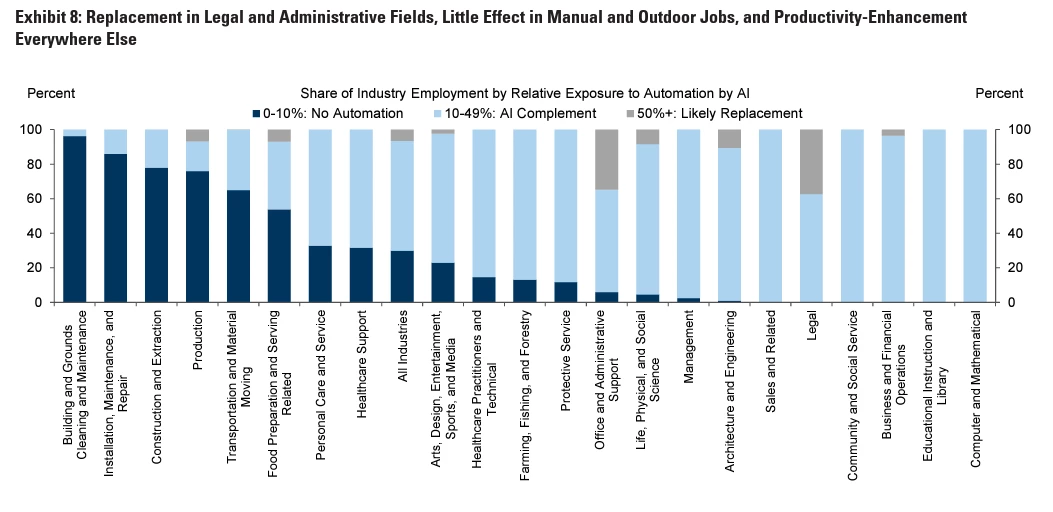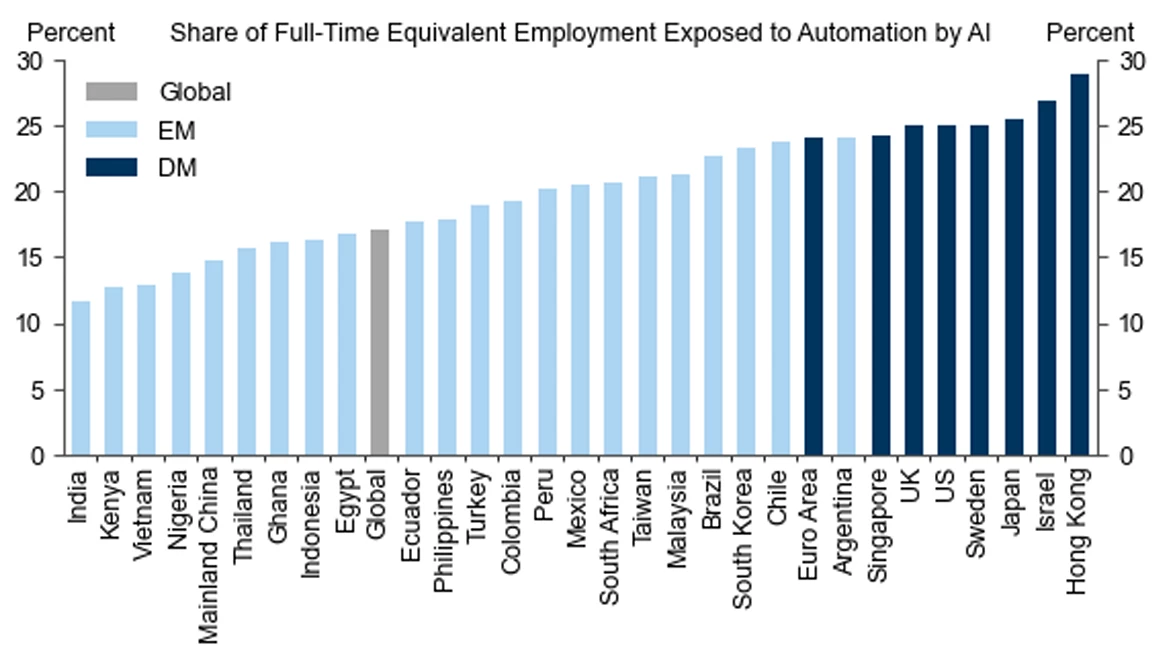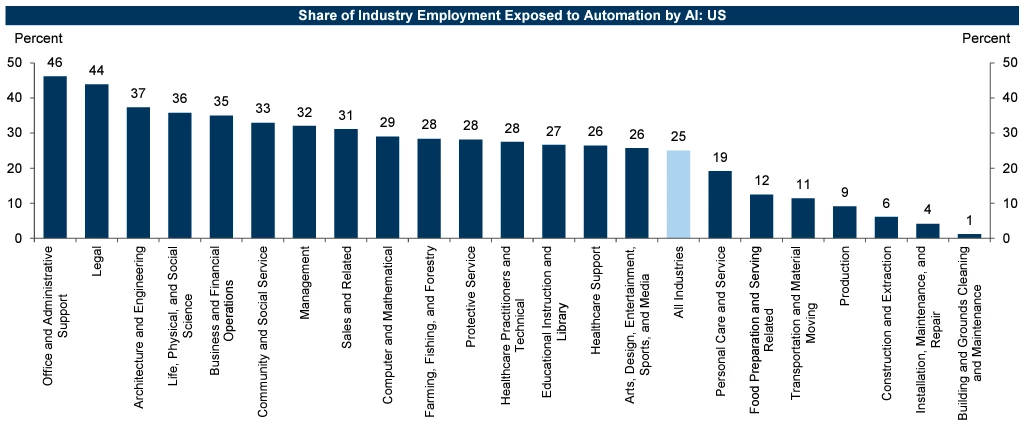OpenAI's ChatGPT is a slow, buggy, boring-looking chat bot that frequently makes things up and cuts off in the middle of answers. But it communicates as well or better than most humans, and writes code as well. It does both in a range of languages, showing some extraordinary insight and creativity at times. It learns at a pace the world has never seen before, and it can do an extraordinary (and rapidly expanding) range of tasks already, that nobody ever specifically taught it how to do. It can do these tasks in a fraction of the time a human would take, for next to no cost.
It's an ominous preview of a looming tidal wave of AI systems set to launch in the coming months and years, each becoming smarter, faster, more capable and more integrated with our lives and our devices. GPT-4's staggering abilities as an "anything machine" will look incredibly crude in a year or two.
We all knew AI automation was coming for jobs; most people would never have guessed that jobs involving communication and creativity would be among the first to take a hit. But today, who's paying a design company to come up with a business logo when Midjourney can pound out hundreds of options in any style for free, with super-fast turnaround times?
A friend of mine who runs a decent-sized company told me at the weekend he'd fiddled with GPT-4, and had it develop a personality type test specifically designed for his industry, as scientifically accurate as Myers-Briggs (that is to say, not at all). He had it design management plans for specific personality types, as well as handbooks to help people understand their own type and how best to work with other types. He had it code up a website that would test employees with multiple-choice questions, then assess them and assign their groups. Entire companies have been formed around this kind of IP; he created something he'd be happy to use in about half an hour, for almost zero cost. A seismic shift is in progress.
The Goldman Sachs report is an effort to make some predictions for what this seismic shift might mean for economic growth. Good on 'em, I say, for taking their best shot when looking at a technology so wildly transformative, so little understood and so terrifyingly fast to evolve.
"If generative AI delivers on its promised capabilities, the labor market could face significant disruption," reads the report. "Using data on occupational tasks in both the US and Europe, we find that roughly two-thirds of current jobs are exposed to some degree of AI automation, and that generative AI could substitute up to one-fourth of current work. Extrapolating our estimates globally suggests that generative AI could expose the equivalent of 300 million full-time jobs to automation."
On the other hand, there will be new jobs generated here as well, and their higher productivity, with low labor costs, "raises the possibility of a productivity boom that raises economic growth substantially." Goldman places an extremely conservative estimate on this: "AI could raise annual US labor productivity growth by just under 1.5 pp over a 10-year period following widespread adoption," but the team admits this figure could be much larger if AIs prove capable of doing more difficult jobs. The final economic impact prediction? "AI could eventually increase annual global GDP by 7%."
7% of entire global GDP is surely an impressive amount of money. But think of it this way: you, me, and everyone else will soon have access to something analogous to a fleet of minions in a box, capable of carrying out tasks almost as quickly as you can tell it to. The amount of bullshit busywork we do should plummet. Many big ideas will take next to no time or effort to execute. 7% seems comically low in that light, although it's worth noting that zero-effort execution will crash the price of output products to nearly zero as well.
Goldman has also taken a stab at working out which jobs will be hardest hit, at least given what we currently understand about the technology. That makes for some interesting reading, particularly if you've got kids in school at the moment.
The report predicts "particularly high exposures in Administrative (46%) and Legal (44%) professions and low exposures in physically-intensive professions such as construction (6%) and maintenance (4%)." The effects, it says, will be felt more keenly in developed countries than in emerging markets, since the latter rely so much more on manual labor, and it seems that affordable general-purpose robots are still a fair way off.

The categories in which the highest percentage of jobs will be more or less completely unaffected by AI automation, according to this report, are Building and Grounds Cleaning and Maintenance (~95%), followed by Installation, Maintenance and Repair (~85%), Construction and Extraction (~75%), Production (~72%), Transportation and Material Moving (~65%), and Food Preparation and Serving Related (~50%).
On the other hand, nearly everyone on the right hand side of the chart can expect AI to make radical changes to their workflows. That includes workers in Healthcare, Agriculture, Creative areas, Management, Sales, Social services, Finance, Education and Computing. Goldman doesn't see a lot of job losses in these areas, though.
Behind Admin and Legal, where nearly half of all jobs are expected to be under threat, Goldman estimates the categories most at risk of wholesale job replacements include Architecture and Engineering (around 10% of jobs are expected to disappear), Life, Physical and Social Science (~8%), Food Preparation and Serving (~7%), Production (~7%), Business and Financial Operations (~4%), and Arts, Design, Entertainment, Sports and Media (~3%).
Overall, the report predicts about 7% of US workers having the experience of being booted out of their job by an AI – and that most of them will find new jobs in "only slightly less productive positions."

In aggregate, the report looks pretty dang rosy from where we're standing – perhaps way too rosy. The coming wave of AIs will be expert communicators that can learn nearly any process in a jiffy, and execute complex tasks – with insight and rapidly acquired expertise – based on casual written or verbal commands in whatever language you prefer. If you don't like what they make you, they'll tweak it in an instant without complaint, or start over. Industry-specific models are already being trained and refined specifically to tackle certain jobs.
Furthermore, GPT-4 is already multimodal – it's beginning to demonstrate an extraordinary ability to interpret images, audio and video, and infer a spectacular amount of information from what's seen and heard.
What's more, humanoid robots are most certainly advancing – albeit at a slower rate. It's hard to imagine that within a decade, there won't be androids around capable of serving some multi-purpose labor duties. These will start out as some of the worst worksite apprentices ever, but they'll watch and learn and refine, sharing their knowledge as a swarm.
GPT-4 can already look at a photo of a cafeteria and tell a blind person where to go for the bathrooms, or where the empty tables are. Embedded in a robot that can make physical changes to the world around it, I find it hard to believe that even this rudimentary kind of intelligence would struggle for long with most physical jobs.
Nobody's willing to put a timetable on general superintelligence yet – the point where AIs become more competent than humans across the vast majority of all tasks. But it's hard to look at GPT's meteoric rise and conclude that humans are so special that AIs and robots can't copy us or do things better. It seems to me that in the medium term, we'll have plenty of value working on novel problems and edge cases, but edge cases at least tend to dwindle over time.
As a tech writer, the writing is definitely on the wall for my colleagues and I; this piece took me all afternoon, while ChatGPT could've given you a summary of this report in less than a minute. At this stage, we're choosing not to use it. How do you feel things look in your occupation?
Source: Goldman Sachs






